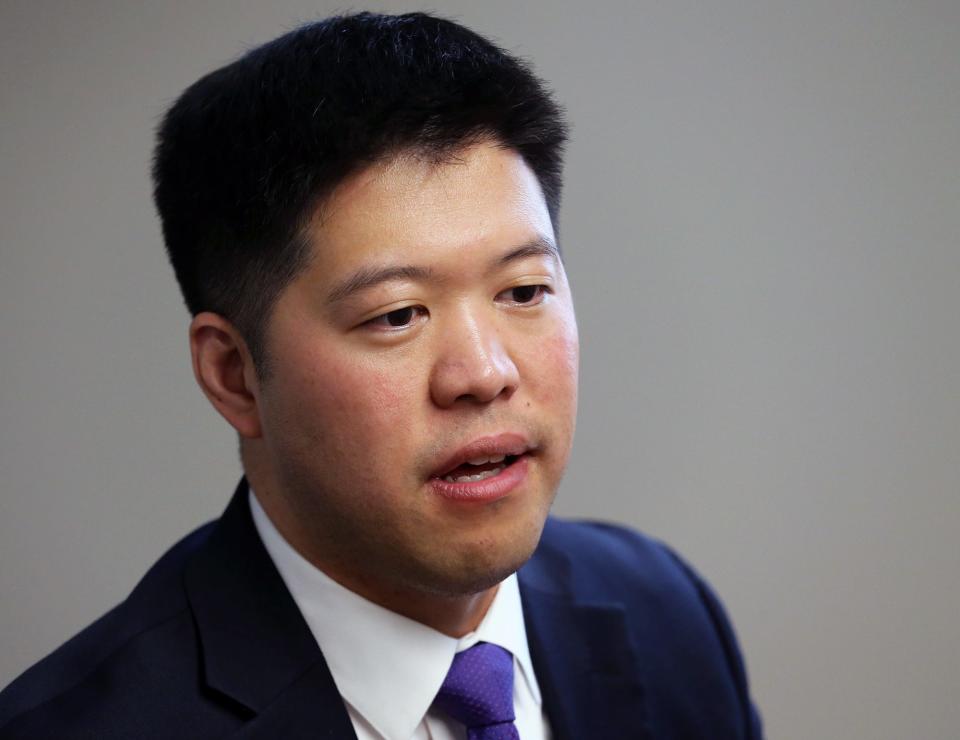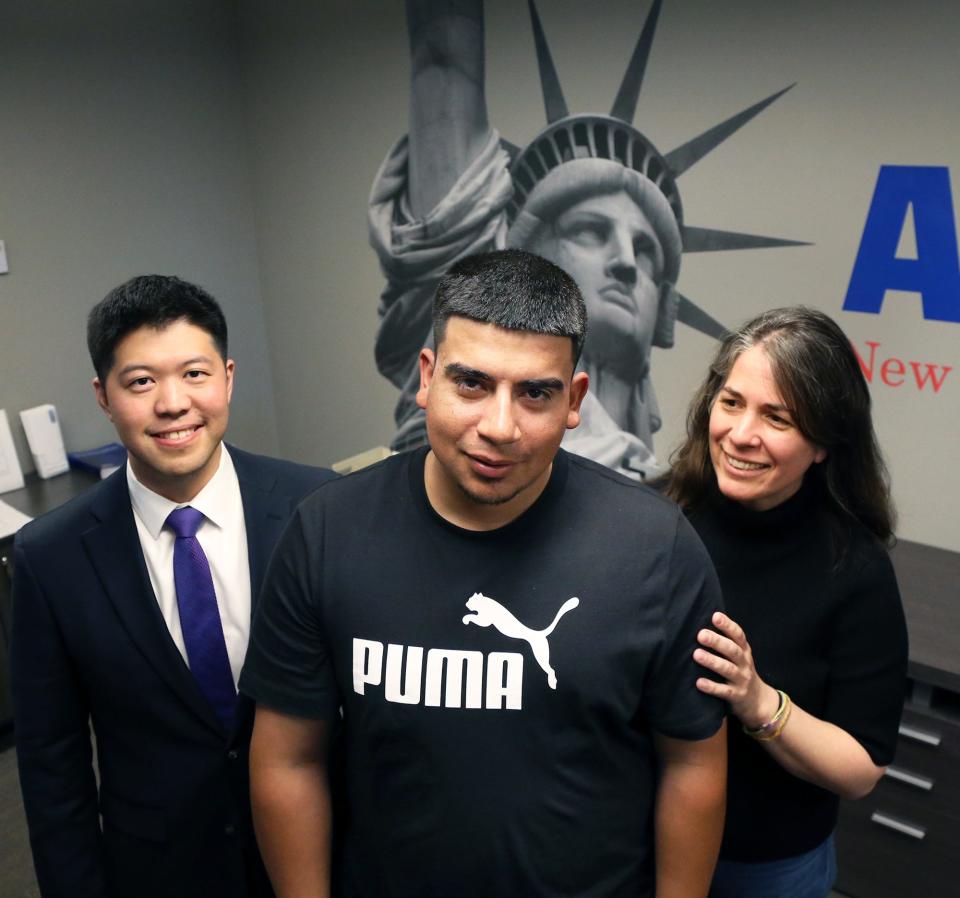A mistake sent an asylum seeker to El Salvador. Then he was tortured, a lawsuit claims
PROVIDENCE, R.I. — José Daniel Guerra-Castañeda struggles to talk about the trauma that has profoundly scarred his body and mind.
False accusations he was a murderer and MS-13 gang member. An unlawful deportation riddled with government errors. Nearly 300 days of torture and starvation in an El Salvador prison. Winning his innocence despite long odds — only to be cuffed and thrown back into U.S. immigration detention for two days after his plane landed in America.
“Everything was taken away from me,” Guerra-Castañeda, 25, told the USA TODAY Network on May 11 through an interpreter.
Guerra-Castañeda is suing the U.S. government over his ordeal.
Despite the pain and the potential for additional discrimination against him, Guerra-Castañeda said he’s speaking out about his lawsuit because “many people… don’t care” about civil rights abuses that people seeking asylum endure.
“The government didn’t comply with protecting me,” he said. “It doesn’t only happen to me.”

Federal lawsuit alleges U.S. illegally deported asylum seeker
The three-count federal lawsuit
alleges Immigration and Customs Enforcement and the Department of Homeland Security were negligent when they unlawfully deported him in September 2019, despite two federal court orders that should've temporarily halted his deportation while his asylum case was pending.
The American Civil Liberties Union of New Hampshire and Preti Flaherty LLP, a Concord, New Hampshire, law firm, are representing Guerra-Castañeda.
“ICE’s violation of federal court orders to keep our client in the country cost him horrifying physical and emotional trauma that will last a lifetime,” said SangYeob Kim, immigration staff attorney at ACLU-NH. “No one is above the law, and when the court issues an order, we are all bound to uphold it — especially the United States government.”

Guerra-Castañeda's deportation
Guerra-Castañeda, a Salvadoran national who lives in Massachusetts, began seeking asylum as a juvenile about seven years ago. He received Special Immigrant Juvenile status in 2021 and is in the process of obtaining his green card.
After Guerra-Castañeda immigrated to the United States and sought asylum in 2018, El Salvador officials falsely accused him of murder and of being a member of MS-13, an international crime organization, the suit alleges. The MS-13 allegation prompted an Interpol Red Notice for Guerra-Castañeda’s arrest.
'There's no security': Children of immigrants fear deportation when they turn 21
ICE agents apprehended Guerra-Castañeda in August 2018 in New Bedford, Massachusetts, because of the notice, according to earlier news reports. Guerra-Castañeda was initially detained at the Strafford County Department of Corrections in Dover, New Hampshire, then transferred to Louisiana and then deported to El Salvador in September 2019.

Guerra-Castañeda was ultimately found not guilty of the charges and released by El Salvador.
U.S. government admits errors
The government admitted in court documents that Guerra-Castañeda was wrongfully deported in its response to a separate lawsuit the ACLU filed on his behalf in 2019.
He was “mistakenly forgotten” by immigration officers who overlooked the U.S. First Circuit Court of Appeals' orders and made other administrative errors while transferring him to El Salvador, the government admitted.
"The government fully recognizes the seriousness of its mistake and respondent’s efforts — initially, pursuant to his own initiative and, later, also pursuant to the court’s order — to explore options for facilitating Mr. Guerra-Castañeda’s return to the United States and to discern how he came to be removed in the first place are ongoing," government attorneys wrote in a filing on Sept. 14, 2019, one day after deporting him.
ICE and Homeland Security officials couldn’t immediately be reached for comment about Guerra-Castañeda’s new lawsuit.
The suit, filed May 10 under the Federal Tort Claims Act, seeks monetary damages for the “acts and omissions” of government employees and officials.
The U.S. government has 60 days to respond to Guerra-Castañeda’s claims.
‘They just didn’t even give him a chance’
Before the deportation, a First Circuit judge issued two stay orders in 2019 because of evidence Guerra-Castañeda’s attorneys presented indicating he’d be tortured if he returned to his native country. The judge ordered Guerra-Castañeda’s attorneys and the government to spend more time investigating the torture claims before continuing with the removal.
“It was a routine case,” said Nina Froes, an immigration attorney who has represented Guerra-Castañeda since he was 18. “It seemed like a slam dunk.”

Two days later, on Friday, Sept. 13, 2019, the U.S. government violated the orders and deported Guerra-Castañeda without first notifying his attorneys. His attorneys allege this “grave mistake” eviscerated their client's right to challenge his removal from the United States.
“They just didn’t even give him a chance,” said Froes.
At the time of Guerra-Castañeda's deportation, preliminary affidavits from immigration lawyers around the country showed at least eight similar wrongful deportation cases had occurred within the previous year, the ACLU has said.
In three cases, the person was illegally removed despite the law prohibiting their deportation. In five cases, lawyers learned their clients were about to be illegally deported, and made successful attempts to keep them in the U.S.
Migrants at the southern border: Federal judge rules Title 42, allowing COVID-19 asylum restrictions, must continue at border
297 days of prison torture
Guerra-Castañeda’s torture fears were realized when El Salvador law enforcement personnel cuffed and jailed him the moment he landed, the lawsuit alleges.
Guerra-Castañeda’s voice grew soft and his eyes distant several times while discussing El Salvador during a May interview with the USA TODAY Network at one of the ACLU’s New Hampshire offices.
“I came here, to this country, and all of a sudden I was like a bad person,” he said. “I was being accused of things I hadn’t done and... I didn’t have the chance to explain who I was and what I thought.”

During the interview, he asked not to discuss specifics about the alleged prison torture, the individuals responsible or the reasons why he was falsely accused. Guerra-Castañeda consented to being interviewed and photographed but he and his attorneys asked the USA TODAY Network not to disclose the Massachusetts town he lives in or publish video or audio of the interview.
Guerra-Castañeda’s 17-page tort claim
does outline the torture in detail.
El Salvador imprisoned him in Bartolinas de Cajutepeque for 297 days — despite the fact that a local prosecutor "right away" dropped the MS-13 charge due to a lack of evidence once Guerra-Castañeda was in custody, according to his attorneys.
Guerra-Castañeda’s attorneys believe he wouldn't have been deported if it weren't for the MS-13 allegation.
“I was really upset because your government issued an Interpol Red Notice and... got all this (local) media and framed him as an MS-13 member, but once you had José, you're dismissing the charge you presumably don't even have any evidence to prove?" said Kim, the ACLU attorney.
Prison employees and government officials tortured Guerra-Castañeda "ten to fifteen different occasions" during the 297 days he spent behind bars in El Salvador, the suit alleges. The country kept him and 55 other people in a small cell with one toilet, no shower and no COVID-19 safety measures, the suit alleges. They also allegedly blocked his mother's attempts to provide him food and medication for injuries and infections he suffered from the torture.
The facility requires family members to provide food for the people it detains, according to Guerra-Castañeda. He alleges he lost 120 pounds, dropping from his normal weight of 240 to 120, because the facility didn’t provide him proper nourishment despite the fact that it limited visitation due to the COVID-19 pandemic.
In addition to the prison torture, he asked not to discuss what he says was extensive physical and emotional abuse he suffered as a child.
His suit accuses multiple close family members of abusing him, including a Salvadoran officer whose police colleagues allegedly joined in on some of the beatings. The suit draws close links between his childhood abuse and the reasons he sought asylum when he turned 18.

Pursuing accountability and a dream life
Kim said Guerra-Castañeda was “really fortunate” to beat all of the charges against him and come back alive.
El Salvador released him on July 6, 2020.
Guerra-Castañeda said his relief was immense but fleeting. When his plane arrived on the Boston-Logan International Airport tarmac, ICE agents took him into custody again and brought him back to Strafford County for immigration detention.
Those additional two days in jail — an unnecessary measure, his attorneys argue — were excruciating. Guerra-Castañeda said they resurfaced and deepened his trauma.
“I felt discriminated (against),” he said. “It was like going back to square one, to go back to the beginning when everyone was pointing out I was a bad person.”
The government made various records and protocol changes within its immigration system as a result of Guerra-Castañeda’s unlawful deportation, according to court documents.
Beyond immigration: ICE's massive surveillance system has info on most Americans, report says
More needs to be done, Kim argued. On top of monetary damages to help Guerra-Castañeda, Kim said the lawsuit should prompt the government to provide “much more care” during all stages of immigration cases and deportations.
“As a lawyer who knows the international law the U.S. has signed onto (involving refugees and torture), it doesn’t really matter whether he was accused of having committed crimes,” said Kim. “If there are concerns he would get tortured and the First Circuit (court) says, ‘No, do not deport him’ … then it’s common sense that the government has to provide extra care to make sure they don’t make any mistakes.”
Guerra-Castañeda said holding the government accountable will help him to heal.
A number of daily tasks can trigger his trauma and he’s not yet comfortable discussing what happened in detail with those around him in Massachusetts.
He’s working as a framer with a construction company and recently helped build retirement homes on Cape Cod. He has also started dating someone he “met a long time ago” in El Salvador — a relationship he counts as among the bright spots as he attempts to fulfill the dream he’s carried since the very beginning of his asylum.
His hope is to one day raise a family and live in a house surrounded by fields and nature, far away from the city.
“I’m not the person that they’ve (labeled) as a gang member,” he said. “I am a person who wants to give things to this country and to work hard."
Follow Kyle Stucker on Twitter: @KyleStucker.
This article originally appeared on USA TODAY NETWORK: Massachusetts man suing ICE after deportation, torture

 money
money 